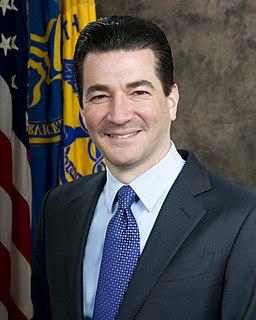It is Game On! at Commissioner Scott Gottlieb's U.S. Food and Drug Administration.
Recognizing the FDA lacks a direct role in drug pricing, his overarching strategy is to facilitate increasing market competition so as to drive down prices-- thereby increasing accessibility and innovation (see details of his Drug Competition Action Plan here). His parallel focus to achieve these goals is to curb abuses of the Orphan Drug Act (ODA).
President Reagan signed the Orphan Drug Act in 1983 in an attempt to incentivize discovery. Smaller population “Orphan Diseases”, defined as those that afflict less than 200,000 people across the nation, include conditions like Cystic Fibrosis, ALS, acromegaly (aka gigantism) and Tourette’s Syndrome.
But they collectively impact 25 million Americans, a substantial public health issue.
In Did Pompe Disease Get A New Champion In President Trump?, I discussed the importance of the President highlighting the genetic disorder in his speech addressing a joint session of Congress. According to the National Institutes of Health, a rare, inherited disease like Pompe affects about 1 in 40,000 people in the United States while all glycogen storage diseases affect 1 in 20,000. Compare that to the 40,000 women who will die from breast cancer and you can see why it doesn't get as much attention.
Perhaps President Trump's mention is a sign that he truly cares about science and health research. Not just the government-funded kind, but making treatments easier to get across the spectrum. His appointment of Commissioner Gottlieb affirms these goals. The big reason why rarer diseases get fewer treatments is because we have a regulatory process that forces business decisions to go for the "home run." With a dozen years and $1.2 billion, almost double what it was 20 years ago due to increased bureaucracy, a drug that has a small market has little chance, even if it works after thorough testing. Even Hepatitis C, which has a huge market, has to have a high price tag because up to 70 percent of the patent period is now tied up getting approval.
There is already a faster route for "orphan" drugs, which helps to bypass the financial obstacles of getting ordinary approval. And to some extent, it has worked. According to the U.S. Food and Drug Administration (FDA) more than 250 drugs “available to treat a potential patient population of more than 13 million Americans” have become available in the three decades since it became law.
As Dr. Gottlieb says, "Companies that receive orphan drug designation for their product qualify for various incentives including tax credits for clinical trial costs, relief from prescription drug user fees and the potential for seven years of marketing exclusivity after the drug is approved." As a result, the requests are consistently rising, having doubled from 2012 till 2016.
However, in Gottlieb's recently posted blog updating the status of his Orphan Drug Modernization Plan, the Trump appointee recognizes, "For all the success of the ODA, there’s been criticism that some sponsors are using designations as a way to sidestep other important public health goals set out by Congress...FDA plans to advance certain guidance documents and other policies to address these issues. One guidance document will close a loophole that allows sponsors to avoid an obligation to study drugs in pediatric indications...Now, instead of instigating more pediatric research, the granting of the orphan designation in the pediatric subpopulation can have the opposite effect."
Here are some key commitments he made three months ago that he hopes will "maximize new opportunities" for those who suffer from rare diseases that have little to no treatment, create safe and effective innovative therapies and incentivize pediatric research:
- Eliminate backlog of roughly 200 orphan drug designation requests that were pending review with FDA
- Already achieved and ahead of schedule. With strong language that this will never happen again.
- A review of ODA policies to ensure demands on FDA don't stifle innovation, are "modern and efficient"
- Create new policies that obligate the FDA to respond to such requests within 90 days
- Soon to hold public forum to get input on complicated science and regulatory processes to make certain the promises of the ODA are consistent with Congress' intentions and the FDA designations follow current science
Things are definitely changing at the FDA. At this point, it is a pretty good start at that.
Note(s):
To get a better understanding of the governmental investigations into drugmaker abuses of ODA as well as the tactics used to circumvent existing laws, see here.




